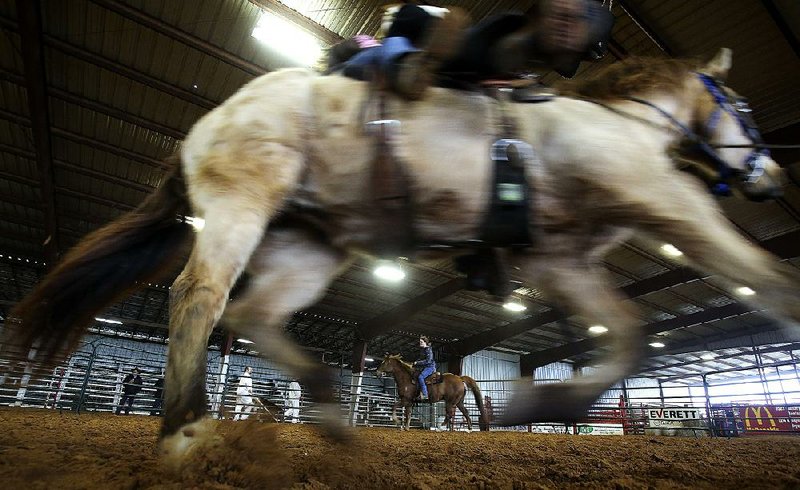Mouse spent more than 15 years on patrol near inmates on work details for the Arkansas Department of Correction's Tucker Unit, but on Saturday, she got to retire.
Mouse weighs about 1,025 pounds, stands 4-foot-7 at the withers and is one of 33 horses that the Department of Correction sold Saturday at the eighth annual Good Homes for Good Horses auction held at the Saline County Fairgrounds. The department breeds and raises its own horses to be strong, temperate mounts for inmates and officers to ride.
Saturday afternoon, a man in a white jumpsuit -- one of the many inmates who care for the horses -- trotted Mouse in an arena where more than 200 people were watching. For other horses, bids flew in faster than even professional auctioneer and former state Rep. Mark McElroy could count.
But for Mouse, only one person rose to his feet and signaled his bid -- a little boy no older than 5.
"That's what we like to see," said Tom Green, horse program coordinator and emcee for the auction. "That's what it's all about."
The horses, Green said, are mostly older animals who have served for years in some capacity for the department.
Some horses go out chasing escapees with the hounds, but most spend their days herding cattle, patrolling work units or working on one of the department's many farms.
The Arkansas Department of Correction's Agriculture Division's work covers more than 20,000 acres across the state, spokesman Solomon Graves said. On those lands are crop fields, gardens, cows, pigs, chickens and, of course, horses.
The horses serve many purposes, livestock manager Jason Martin said, but one of their primary services is inmate rehabilitation.
Class 1B inmates -- those who have proved that they are not flight risks or a danger to anyone around them -- can sometimes work with the horses eight hours a day, Martin said. The bond that inmates form with the animals, he said, is extraordinary.
"If there are issues going on in your life, you have to drop them," Martin said. "You have to make peace with yourself if you're going to work on an animal that size."
Derrick Witherspoon, who was released from prison about six months ago after serving a 17-year sentence, agreed.
"There's nothing like the bond that you have with that animal," said Witherspoon, whom correction administrators affectionately called "Spoons."
"When you're working with cows, you have to trust that that horse is going to protect you. You have to trust that it's going to do what you say. It's really incredible."
Spoons, who was 17 when he was sentenced to 40 years in prison on a charge of capital murder, said his time working on the farm helped him turn his life around. He now works for a pipe production company and shoes horses on the side.
"It's had a tremendous effect on my life," he said. "I've developed an affinity for them. I think it's the calmness and peace you feel with them."
One day, he said, he wants to buy his own horse again.
"There's something about the outside of a horse that's good for the inside of a man," said Green, quoting Winston Churchill.
Wendy Kelley, director of the Arkansas Department of Correction, said working with the horses is therapeutic, but also helps the inmates learn responsibility and patience.
"It's good, healthy, outdoor work," Kelley said. "And the inmates really learn to care about the horses."
Prison systems have used mounted officers for centuries, but Arkansas' did not start breeding its own horses until the late 1980s, according to Earl Pepper.
Pepper, who started the breeding program around 1987, said it was difficult and expensive to find horses that were gentle but strong enough for hard work. So, Pepper suggested that the department begin breeding its own horses -- and officials agreed.
Pepper stood near the arena Saturday afternoon as he mingled with the horses. All of this, Farm Administrator Davey Farabough said, was Pepper's doing.
The auctions didn't begin until 2011, when Green suggested to Mary Parker-Reed that instead of selling the horses at a local sale barn, the department should hold an annual auction.
The purpose of the auction, he said, is to ensure that each horse goes to a good home.
Green said Parker-Reed, Arkansas Board of Correction vice chairman, thought for a moment before saying, "You're right. We should."
"She did all the work," Green said. "We're very thankful for that."
A few weeks after that conversation, the department held its inaugural auction. Since then, Green said, the event has grown to include horses from the Little Rock Police Department's mounted division.
Double Deuce, a 20-year-old sorrel, is among the longest-serving horses in the Little Rock Police Department's mounted division. Double Deuce served at 13 state fairs, 12 Riverfests, and at least 250 school and public demonstrations.
On Saturday, Double Deuce was loaded into a trailer headed for Texas, where he will spend his days in a therapeutic riding program.
"This is all about finding them a good home," Farabough said. "They do a lot of good work, and they deserve that."
Metro on 03/10/2019
